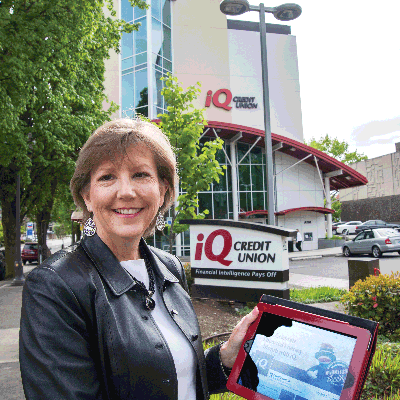Local government ready to listen
Cote said that significant innovation cannot happen unless local government is interested – working to build new business, making it easy to start and guide businesses through the process, open to hearing what their needs are and looking for out of the box ways to encourage innovation.
“I do see that happening in Southwest Washington,” said Cote. “[Local government] is looking to build trust with new entrepreneurs and existing businesses.”
Education attuned to business needs
“Whenever you see regions that are successful, there’s a university nearby,” noted Cote. She said WSU Vancouver’s cutting-edge programs in business, digital technology, sciences and engineering are attracting faculty that is doing important research. Additionally, there’s the school’s Mentor and Analysis Program (MAP) and classes that encourage innovation, such as the College of Business’ recent entrepreneur class, which had two students who were starting their own businesses.
“The energy and excitement is starting to grow,” said Cote.
Skip Newberry is president of the Technology Association of Oregon (TAO), which has several members in Southwest Washington. Newberry said WSU Vancouver’s fabrication facility that allows students to do work in a semiconductor production setting “is an incredible setting for applied learning.” He was also enthusiastic about the digital media program, stating that there is a strong desire in the region for people who are knowledgeable about design and user experience, but also translate customer requirements into backend technologies.
Alisa Pyszka, vice president of recruitment and expansion at Greater Portland Inc. and former business development manager for the city of Vancouver, said that Southwest Washington’s colleges, university and K12 systems are “remarkable” in that they are forward thinking.
“They’re focusing on the future economy and future skills needed, and developing their programs around that,” said Pyszka. “They have a genuine integration with the business community to make sure they are getting the workforce and talent they need.”
Networking opportunities
The third factor Cote identified as important to fostering innovation in the region is networking opportunities. Networking groups, said Cote, enable people to come together and talk about shared interests – whether they are starting the same kind of business, or have common questions about marketing, where to locate, or where to find customers.
Growing interest in the region
The final necessary factor, according to Cote, is businesses and talent that are interested in living here. She called Southwest Washington an “easy place to live” with a friendly community and an accelerating cultural creativity.
Newberry pointed out that quite a few investors have chosen to settle in Southwest Washington, which, he said, was a good thing for the region.
“We’ve had more early stage angel investing in recent years,” stated Newberry.
“It’s nice to see an influx of additional capital.”
But, cautioned Newberry, while we can’t discount quality of life as a factor that attracts innovators, we “can’t count on importing people in perpetuity.” That is, he said, the region shouldn’t bank on just the quality of life element without paying attention to job creation.
Huseby agreed, stating the “jobs draw people here. Community keeps them here.”
“We need to think about how to grow the local base of talent,” said Newberry. “The university and colleges plus K12 need to work together on that.”
Working together
Newberry’s point about working together was a theme echoed by Cote, who said that “the elements have to work together” to be successful.
“Working together will lead to serial innovation and acceleration,” she stated.
Pyszka pointed out that there is a healthy startup ecosystem in Portland that is open to collaborating with Southwest Washington entities.
“You don’t have to reinvent the wheel if you’re open to the regional approach,” she said.
Newberry and Cote agreed that Southwest Washington’s recent Innovation Partnership Zone (IPZ) designation is a “great starting point for bringing together people that have great ideas.”
According to Newberry, the IPZ provides an opportunity to ask questions and have initial conversations about exactly what the designation means for the region and how groups can work together to realize the IPZ’s full potential.
“We have to be more collaborative – public, academic, nonprofit, private,” said Newberry. “The designation can get people together so that two plus two equals five.”
He made the recommendation that it would help to identify a single organization that is deemed neutral to serve as an umbrella organization, helping coordinate the efforts of the varied groups driving innovation in the region. Also, he said, there must be “buy-in at the execution level and with the top elected officials” to “lower bureaucratic hurdles.”
“The region is in a good position to become a technology hub – if we get our act together,” concluded Newberry.
{jathumbnail off}






